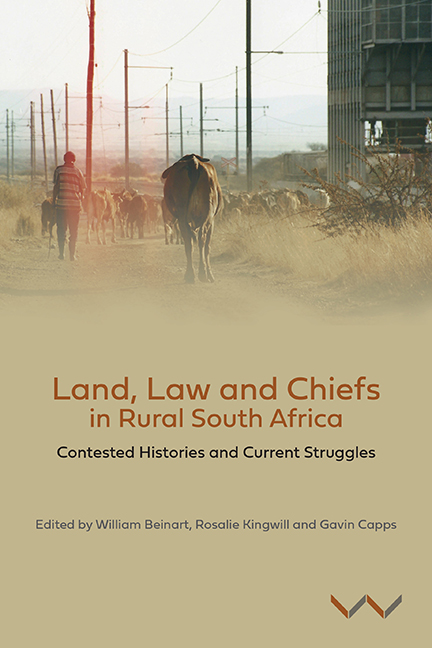Book contents
- Frontmatter
- Contents
- Maps
- Acronyms and Abbreviations
- Preface
- Introduction Land, Law and Chiefs: Contested Histories and Current Struggles
- Chapter 1 Constitutional Court Judgments, Customary Law and Democratisation in South Africa
- Chapter 2 Was ‘Living Customary Law’ There All Along?
- Chapter 3 When Custom Divides ‘Community’: Legal Battles over Platinum in North West Province
- Chapter 4 Chiefs, Mines and the State in the Platinum Belt: The Bapo-ba-Mogale Traditional Community and Lonmin
- Chapter 5 Mining, Graves and Dispossession in Mpumalanga
- Chapter 6 The Abuse of Interdicts by Traditional Leaders in South Africa
- Chapter 7 Resisting the Imposition of Ubukhosi: Contested Authority-Making in the Former Ciskei
- Chapter 8 Black Landlords, Their Tenants and the Native Administration Act of 1927
- Chapter 9 Customary Law and Landownership in the Eastern Cape
- Chapter 10 A History of Communal Property Associations in South Africa
- Chapter 11 ‘This is Business Land’: The Hlolweni Land Claim, 1983–2016
- Chapter 12 Restitution and Land Rights in the Eastern Cape: The Hlolweni, Mgungundlovu and Xolobeni Cases
- Contributors
- Index
Chapter 4 - Chiefs, Mines and the State in the Platinum Belt: The Bapo-ba-Mogale Traditional Community and Lonmin
Published online by Cambridge University Press: 15 June 2021
- Frontmatter
- Contents
- Maps
- Acronyms and Abbreviations
- Preface
- Introduction Land, Law and Chiefs: Contested Histories and Current Struggles
- Chapter 1 Constitutional Court Judgments, Customary Law and Democratisation in South Africa
- Chapter 2 Was ‘Living Customary Law’ There All Along?
- Chapter 3 When Custom Divides ‘Community’: Legal Battles over Platinum in North West Province
- Chapter 4 Chiefs, Mines and the State in the Platinum Belt: The Bapo-ba-Mogale Traditional Community and Lonmin
- Chapter 5 Mining, Graves and Dispossession in Mpumalanga
- Chapter 6 The Abuse of Interdicts by Traditional Leaders in South Africa
- Chapter 7 Resisting the Imposition of Ubukhosi: Contested Authority-Making in the Former Ciskei
- Chapter 8 Black Landlords, Their Tenants and the Native Administration Act of 1927
- Chapter 9 Customary Law and Landownership in the Eastern Cape
- Chapter 10 A History of Communal Property Associations in South Africa
- Chapter 11 ‘This is Business Land’: The Hlolweni Land Claim, 1983–2016
- Chapter 12 Restitution and Land Rights in the Eastern Cape: The Hlolweni, Mgungundlovu and Xolobeni Cases
- Contributors
- Index
Summary
This chapter arises out of the collective effort of the Mining and Rural Transformation in Southern Africa (MARTISA) research project at the Society, Work and Politics Institute (SWOP), University of the Witwatersrand. My own involvement in researching Bapo history results from long-term academic engagement on the platinum belt. This has included work on legal cases that were brought to support community rights to land and resources, as well as for the Marikana Commission of Inquiry, particularly in relation to the Bapo case itself.
The land near Rustenburg on which the Marikana platinum mine is situated is that of the Bapo-ba-Mogale traditional community. Mining started on this land in the 1970s, yet the community has seen very little benefit. Conflicts between different branches of the chieftaincy have made it difficult for the larger community to become beneficiaries. The state and its officials have acted in such a way as to siphon off the income from the mines rather than return it to the community. This chapter explores the complex and shifting relationship between Lonmin, the mining corporation, the Bapo chiefs and the provincial government since mining began in this area. A particular focus is the multiple crises in legitimate community authority and representation, which have been affected by the interests of Lonmin and the government's interventions. This in turn raises larger questions about contested histories around traditional authorities when they become vehicles for the management of major resources. New legislative frameworks also underpin the experience of traditional councils, communities and ‘empowerment’. These are issues of growing concern as they are increasingly replicated across the rural areas of South Africa.
The bulk of this chapter focuses on the long and troubled relationship between chiefs, mines and government. In particular it details the enormous financial losses, of over R600 million, suffered by the Bapo community. In 2012, Lonmin's corporate image was shattered by the Marikana massacre. In the commission of inquiry that followed, Lonmin's failure to meet its social obligations to the surrounding area – a condition of its licence to mine – was laid bare. The spotlight also fell on the dubious role played by Cyril Ramaphosa, a non-executive director on the board of Lonmin, and CEO of its main black economic empowerment (BEE) partner, Shanduka.
- Type
- Chapter
- Information
- Land, Law and Chiefs in Rural South AfricaContested histories and current struggles, pp. 81 - 103Publisher: Wits University PressPrint publication year: 2021



